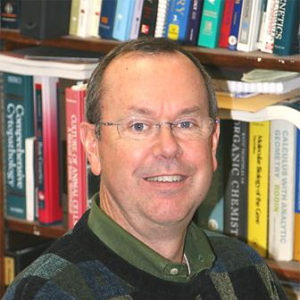
Jerold Woodward, PhD
Connect
Office: (859) 323-5538jwood1@uky.edu
Positions
- Professor
- Co-director, Flow Cytometry and Immune Monitoring Core Facility
- Member, Markey Cancer Center
College Unit(s)
Biography and Education
Education
BS in Biological Sciences, University of California, Irvine PhD in Immunology, University of Utah Postdoc in Immunogenetics, University of Southern California
Research
Dr. Woodward is a full professor in the Department of Microbiology, Immunology and Molecular Genetics at the University of Kentucky where he has had an active, NIH funded research program for the past 35 years. Dr Woodward is an internationally recognized immunologist and an expert in the area of MHC genetics, T cell biology and vaccines. His work has provided insight into the role of MHC gene expression in the immune response, mechanisms of T cell tolerance utilizing novel transgenic mouse systems, the role of T cells in autoimmune disease, and the T cell stress response. He has mentored over 25 pre-and postdoctoral fellows and taught immunology every semester. His main research focus over the past 10 years has centered on the development of novel vaccines that can be used to prevent infectious disease, such as influenza, or treat cancer. Since the beginning of the COVID-19 pandemic, the Woodward lab has focused on the understanding of the antibody and T cell responses to SARS-CoV2. In collaboration with a biotechnology company, the Woodward lab is currently developing and testing a novel SARS-CoV2 vaccine. Dr. Woodward is currently a member of the University of Kentucky CURE Alliance tasked with coordinating the University of Kentucky research response to the COVID pandemic. Dr. Woodward also co-directs the Flow Cytometry and Immune Monitoring Core facility, which provides immunology consulting and services to the University community. In response to the COVID pandemic, Dr. Woodward has established comprehensive immune monitoring capabilities for SARS-CoV-2 including serological assays and T cell immunity. Dr. Woodward has been a regular reviewer for scientific journals and has been an associate editor for the Journal of Immunology. He has also served on over 20 different NIH and international grant review panels and has been a regular member of two NIH study sections and chair of a National Arthritis Foundation study section. He has authored or co-authored 72 peer reviewed publications and is a co-inventor on three US patents. In 2020, Dr. Woodward received a major research contract from the NIH and has been named an Investigator for the Center for Influenza Vaccine Research for High-Risk Populations (CIVR-HRP). As part of this contract, the Woodward lab will work on a next-generation universal influenza vaccine.
Selected Publications
Murapa, P., Gandhapudi, S, Scaggs, H., Sarge, K., and Woodward, J.G. 2007. Physiologic fever temperature induces a protective stress response in T lymphocytes mediated by HSF1. J. Immunol. 179:8305
Jain A, Yan W, Miller KR, O’Carra R, Woodward JG, Mumper RJ. 2010. Tresyl-based conjugation of protein antigen to lipid nanoparticles increases antigen immunogenicity. Int J Pharm. 401: 87-92.
Murapa P, Ward M, Gandhapudi S, Woodward JG and D’Orazio S. HSF1 protects mice from rapid death due to Listeria monocytogenes infection by regulating expression of TNFα during fever. 2011. Infect. Immun. 79:177-84.
Gandhapudi, S, Murapa, P, Ward, M, Sarge, K. and Woodward, J.G. 2013. HSF1 is activated as a consequence of lymphocyte activation and regulates a major proteostasis network in T cells critical for cell division during stress. J Immunol, 191:4068-79.
Gandhapudi, S., Ward, M, Bush, J.P.C., Bedu-Addo, F., Conn, G. and J.G. Woodward. Antigen priming with enantiospecific cationic lipid nanoparticles induces potent antitumor CTL responses through novel induction of a type I IFN response. 2019. J Immunol, 202(12): 3524-3536.